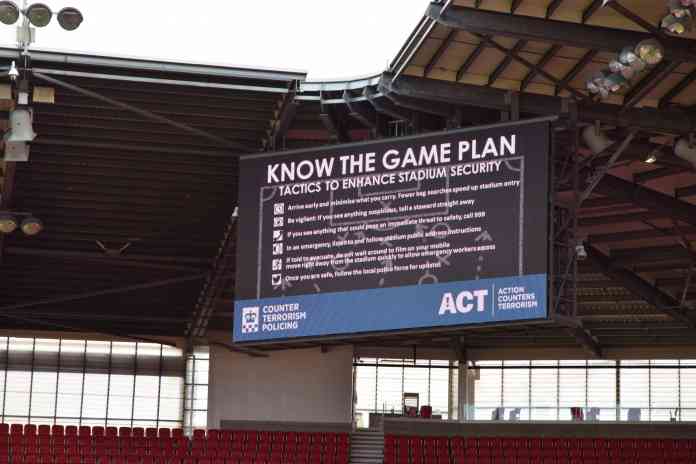
Know the Game Plan - sports fans urged to be vigilant
With the football season in England now a few weeks in, Counter Terror Policing detail their ‘Know your Game Plan’ advice, and why supporters are integral in fighting the threat of terrorism at sporting events
After a long summer of international sport, the domestic football and rugby seasons have kicked off with a reminder to supporters to be vigilant and ‘Know the Game Plan’. The appeal comes from Counter Terrorism Policing (CTP) and is part of the work officers have been carrying out in the sports sector to encourage fans to report any security concerns to stewards or staff.
CTP has been working with the Premier League, English Football League (EFL), Premiership Rugby and individual clubs to enhance measures designed to keep supporters safe, and to raise awareness of the threat from terrorism among club employees and supporters. While there is no specific threat to football or rugby grounds, the project is part of a wider police plan to work more closely with different crowded places sectors such as retail, hospitality and entertainment.
Other sports such as cricket and tennis have also been supporting the initiative, while former England football internationals Alan Shearer, David Seaman and Paul Parker took part in a police ‘Know the Game Plan’ Twitter campaign during the World Cup.
Additionally, nearly a quarter of a million sports event stewards have been issued with a short guide giving key advice to help protect crowds of spectators. This takes the form of a compact, credit card size booklet that acts as a quick aide memoire on actions to take in different security situations. These are predominantly, but not exclusively, terrorism related. For example, there is information on how to deal with exposure to hazardous substances such as acid. This advice has already been shared with emergency service first responders and is now being extended to private sector security workers.
A successful security operation
National police coordinator for protective security, Chief Superintendent Nick Aldworth says: “The chance of being caught up in a terrorist attack is low but it is important the public feel confident in coming forward and report any concerns to matchday staff or police if they see something suspicious. We know fans can play a role in a successful security operation and the more clubs encourage supporters to do this, the more likely they are to act on their instincts and not worry they might be mistaken or wasting time.
“Most concerns will turn out to be nothing and that’s absolutely fine. It’s far better to say something than risk an important piece of information being missed. Our mantra is Action Counters Terrorism. If you see something, don’t hesitate to ACT.”
In the week leading up to the first round of Premier League fixtures, CS Aldworth visited Stamford Bridge to see the security preparations being made for Chelsea’s campaign. He followed this up with a trip to the EFL’s Stoke City, where similar work was being undertaken for their first home game against Brentford in the Championship. The visits were an opportunity to see some of the developments over recent months put into action.
Bob Eastwood, security and operations advisor for the EFL, played a key role in bringing clubs and CT specialists together at security workshops and seminars.
He says: “Getting supporters to think about security is just part of the work football has been doing in partnership with the police. Over the last 12 months we have held many events all over the country so counter terrorism officers and stadium security managers can share their knowledge and stay a step ahead.
“Events such as these has helped clubs gain a better understanding of the threat and the many options - large scale and simple - available to them to further enhance existing security measures. In turn, the football professionals can bring our experience of matchday operations to the discussions and help police understand what the challenges are for us.”
Sports venues
Building on the work with football authorities and clubs, police opened their workshops out to other sports with representatives from cricket, tennis, horse racing, netball, among the delegates attending sessions. Officers also addressed the Sports Ground Safety Authority annual conference, attended by a wide range of sports security officials.
CS Aldworth adds: “Football led the way but since starting that work, Premiership Rugby have been doing a great job to ensure the message gets out to their supporters. Our next key project will be to work with the cricketing authorities to look at how we can collaborate on arrangements for next year’s World Cup.
“Again we are stressing this is not because of a specific threat to sports venues but part of CTP’s overall strategy to work as closely as possible with the different sectors that operate in crowded places to collaborate more. Whether you work in a shop or at a sports stadium - whether you are out looking for a bargain or cheering on your team - everyone can play a role in keeping our communities safe. We want everyone to go out and enjoy themselves but feel entirely comfortable in reporting any concerns.”
















